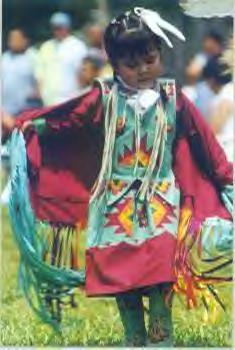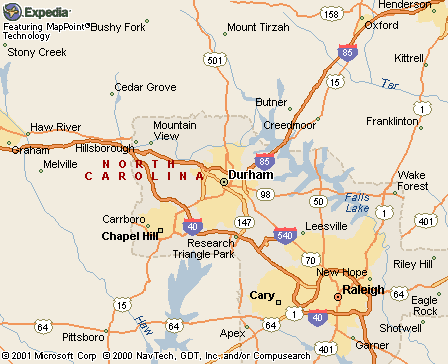|
|
Canku Ota |
|
|
(Many Paths) |
||
|
An Online Newsletter Celebrating Native America |
||
|
December 1, 2001 - Issue 50 |
||
|
|
||
|
Celebrate First Culture |
||
|
Clarice Moran The
Raleigh News Observer - November 16, 2001
|
||
|
photo
by Jamie Lockard
|
|
But one of the most significant things Liles does to promote Indian culture is to participate in the intertribal-multicultural drum group Southern Sun. Southern Sun is a hodgepodge of Native Americans from "practically every tribe in North Carolina," Liles says. It also includes the European-descended Liles -- hence its "multicultural" label. This melting pot approach works well for the group and speaks volumes about the new attitudes among North Carolina's Indians. "We literally come from all sections of the state," Liles says. "And I feel like that makes a very strong statement to modern tribal relations." Liles and the other members of Southern Sun will bring their music and singing to the sixth annual American Indian Heritage Celebration at the N.C. Museum of History on Saturday. Such festivals are vital to breaking up the stereotypes non-Native Americans have about Indians, Liles says. "There are a lot of very negative stereotypes that are perpetuated out there," he says. "[People think] that Indians are savages, alcoholics, live in poverty, only live on reservations, all look a certain way. If people come to this festival, all those stereotypes are going to be thrown out the window." Members of Southern Sun also do their best to crush the subtle racism that exists between different groups of Native Americans. By including members from the state-recognized tribes of Lumbee, Coharie, Eastern Band of the Cherokee, Waccamaw-Siouan and Haliwa-Saponi, the group tries to showcase the diversity of North Carolina Indians. In addition, Southern Sun includes members of the Tuscarora Nation -- a group not recognized by the state -- to model an attitude of tolerance. "We have a lot more to consider when we try to come together," says Southern Sun member Derek Lowry of the Tuscarora Nation. "But to me that's what harmony is all about. Everybody doesn't sing the same note, but it all sounds good together." Southern Sun not only attempts to fuse the various North Carolina tribes, but it also plays music that spans generations. The drumming and singing are modern and traditional at the same time -- a mixture that reflects today's Native Americans. "If you really got down to brass tacks, this style of music is not indigenous to North Carolina," Liles says. "But Indians request the right to evolve. I'm proud of the fact, and I'm sure of the fact, that if any of the new songs were sung to Indian people from years ago, they would think they were good songs." Artist Senora Lynch, of the Haliwa-Saponi tribe, says music and art not only promote Native American culture, but also act as archives to preserve it. Lynch, who has shown her work in the Smithsonian Institution, will demonstrate her pottery technique. "I think it's always important to remember our history," she says. "[Art] is a way of recording history." Lynch, who lives in Warrenton, also is an Indian educator for Warren County public schools, says the designs in her art represent the Southeastern woodland Indians and reflect their stories. She got many ideas for her works by talking to older tribe members since no written record exists. "Some are based on the weather, how we plant a garden, crops, animals," she says. "I've created my own designs, and that makes my pottery unique."
|
||||||||||
|
|
||
|
|
||
| Canku Ota is a free Newsletter celebrating Native America, its traditions and accomplishments . We do not provide subscriber or visitor names to anyone. Some articles presented in Canku Ota may contain copyright material. We have received appropriate permissions for republishing any articles. Material appearing here is distributed without profit or monetary gain to those who have expressed an interest. This is in accordance with Title 17 U.S.C. section 107. | ||
|
Canku Ota is a copyright © 2000, 2001, 2002 of Vicki Lockard and Paul Barry. |
||
|
|
|
|
|
The "Canku Ota - A Newsletter Celebrating Native America" web site and its design is the |
||
|
Copyright © 1999, 2000, 2001, 2002 of Paul C. Barry. |
||
|
All Rights Reserved. |
||

 Joe
Liles wasn't born a Native American, but he has made Native American
culture his life's passion. As a teacher at the N.C. School of Science
and Mathematics in Durham, he organizes a large annual powwow that celebrates
Native American traditions through music and dancing. He also has been
adopted as an honorary Lumbee Indian.
Joe
Liles wasn't born a Native American, but he has made Native American
culture his life's passion. As a teacher at the N.C. School of Science
and Mathematics in Durham, he organizes a large annual powwow that celebrates
Native American traditions through music and dancing. He also has been
adopted as an honorary Lumbee Indian.